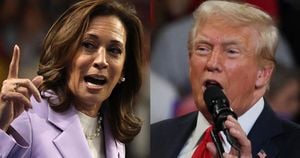Former Florida Representative Matt Gaetz has officially stated he will not rejoin Congress, leaving his seat empty and shaking things up for the House GOP just as they gear up for the new session. After he withdrew from the running to be President-elect Donald Trump’s pick for attorney general, the expected vacancy has raised concerns among Republican leaders, already grappling with a narrow majority.
On Friday, Florida Governor Ron DeSantis pinpointed the timeline for replacing Gaetz, scheduling the primary for his seat on January 28 and the general election for April 1. This timeline implies the Republican Party could be short one seat for over three months during the 119th Congress, which is particularly troubling for House Republicans who are hanging onto their slim edge.
Florida Secretary of State Cord Byrd commented on the situation, assuring voters, "At Gov. Ron DeSantis' direction, this Special Election is being conducted as quickly as statutorily possible. We are committed to ensuring this election is held as soon as we are allowed to hold it by state law.” Indeed, swift action has been the objective, though Gaetz’s departure alters the political chess game considerably.
With the GOP currently projected to hold 219 seats compared to 213 for the Democrats, it’s clear any absence on their side creates ripple effects. Especially as high-profile resignations loom on the horizon—specifically if Congress members like Elise Stefanik or Michael Waltz are confirmed for positions within Trump’s Cabinet, reducing the House majority even more.
Gaetz has long been familiar with the winds of conservative politics. Winning reelection just weeks ago by securing 66% of the vote, he announced his intentions to exit the halls of Congress during his first interview with conservative commentator Charlie Kirk following his withdrawal from the attorney general nomination. "I’m going to be fighting for President Trump. I'm going to be doing whatever he asks of me, as I always have," Gaetz shared. "But I think eight years is probably enough time in the United States Congress.”
The timing of Gaetz’s departure aligns with Florida’s term limits, which cap state legislators' service at eight years. Although staunchly Republican, his absence leaves the seat open for those eager to step up. Already, there's been significant interest from Republican contenders, including state Representatives Michelle Salzman and Joel Rudman, as well as retired Army Capt. and Green Beret John Frankman, among others eager to secure the FL-01 district.
Notably, Gaetz's withdrawal could shift attention back onto sensitive investigations surrounding him, as lawmakers may opt to reopen the Ethics Committee's inquiry, which had remained under wraps until his announcement. This has underscored the precarious balance of political power as ethics investigations intertwine with the push for swift leadership replenishment.
Several factors surround this politically charged departure. On one hand, there are potential ramifications for the Republican Party in terms of legislative effectiveness and coalition building. On the other, there are the personal and legislative aspirations of all those vying for Gaetz's now vacant seat. It’s safe to say both scenarios will play out under the glare of public scrutiny.
Gaetz may have vacated the political stage of Congress, but he’s assuring his supporters and followers he will remain active on the national scene, albeit from different vantage points. He expressed optimism for the future, remarking, "I’m excited to see northwest Florida go to new heights and have great representation." This comment implies both his faith in his successors and his continued commitment to influencing policy from outside the traditional congressional confines.
With the special election on the horizon, the immediate challenge for the Republican Party is self-evident: maintaining their fragile majority as they scout for promises of legislative initiative and political wins. Interest levels will undoubtedly intensify as candidates prepare to stake their claim on what proves to be another pivotal moment for the ever-evolving political narrative of the House of Representatives.
The shift of power caused by Matt Gaetz's absence reminds everyone involved of the competitive nature of American politics—where every seat holds tremendous importance, and the winds of change can alter the math overnight. The designation of his successor will be watched closely, as the dynamics evolve once again and the challenges of partisan governance persist.
This monumental shift—occurring within the backdrop of shifting national sentiments and great political maneuvering—highlights both the unpredictability and excitement of U.S. politics, remaining ever so relevant today.



